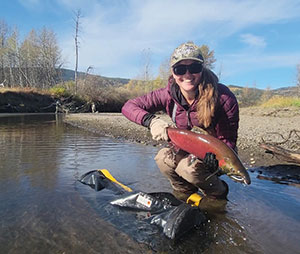
Science - Environment
Creation stewards in a logging town
My little blue Kia Soul didn’t quite fit in, as I drove through the industrial section of the small forestry town of Houston, BC. Not only are trucks the dominant mode of transport, the industrial lots were filled with massive machines used to cut down and transport trees, some with tires the size of my car.
I pulled into a property that also seemed out of place for this community, let alone the industrial neighborhood: a conservation center and fish hatchery. I stepped inside the Buck Creek Hatchery and Nature Centre, and, in a space about the size of a typical classroom, I was surrounded by God’s amazing creation on display. Animal hides and mounts, rocks, fossils, shells, bird nests, antlers, eggs, and aquariums had me looking in every direction.
Like many other Christians, I have often felt a tension in my heart and mind over our role in ruling over and subduing the earth (Gen. 1:28), while caring for it (Gen. 2:15). I ask my children to not deliberately stomp on an ant, but I also don’t struggle with removing an anthill that is becoming a problem for our home.
As I have grown older, I see many more examples of tension woven through life and the Scriptures. It means we need to take the time to listen, and to act with wisdom. So, I figured that agreeing to an invitation to meet with two Christian environmentalists in a resource-dependent town could be a good way to help me grow in navigating this tension over creation care.
Marjorie Lieuwen and Cindy Verbeek welcomed me to the center and took me into a “hands-on” classroom, meant for teaching students about creation. The two shared how at different times, and through different means, the LORD had guided their steps to serve as nature stewards in the middle of a logging town.
 Cindy Verbeek standing in front of the Buck Creek Hatchery’s salmon mural.
Cindy Verbeek standing in front of the Buck Creek Hatchery’s salmon mural.
A common denominator
As a young adult, Cindy spent a summer doing environmental studies at a field school in Michigan. It was during a time of prayer in the forest there that she was convicted to dedicate her life to this work. She then got involved with A Rocha, a Christian conservation organization that was started in Portugal in the 1980s. Her husband and she volunteered there in 1996, and she has served with the organization through various means since then. The couple moved to Houston in 2002, and Cindy began serving on staff with A Rocha from there.
Promoting environmental care in a town that owes its existence to the development of natural resources, particularly logging, comes with challenges. Cindy explained that she started with efforts like a community garden, recycling committee, and farmers’ market. “But none of the things really fit. It didn’t fit me. It didn’t fit the context.” For example, she noted that people in Houston already had gardens that were larger than the community garden, and they already shared.
Things changed when she got involved with the Pacific Streamkeepers Federation, introducing her to work with salmon. She floated the idea of a salmon hatchery in Houston “and all of a sudden people were coming out of the woodwork.” She explained that,
“…salmon are a common denominator in our valley, in Western BC. We are all connected to salmon somehow. We either fish for them, or we love seeing them. We love eating them…. Everyone just loved salmon, and it took me a long time to understand the language of this community.”
She and Regina Meints started a pilot hatchery in a shed in Regina’s backyard, raising 4,400 coho salmon. The experience made them decide they wanted to do this full-time and long-term, so they started making plans. “It started as a salmon hatchery,” said Cindy. “But I am an environmental educator. I love sharing and teaching people about creation, and so I wanted the nature center aspect added to it as well.”
In 2017 the hatchery was built and in 2021, amidst Covid, the nature center was added on. But that also meant the expectations grew. “I was very quickly realizing that this project was way bigger than myself,” explained Cindy. Providentially, that was also the year that Marjorie Lieuwen landed in northern BC.
From the prairies to the mountains
 Marjorie Liewen with quite the coho salmon during a broodstock capture for the hatchery.
Marjorie Liewen with quite the coho salmon during a broodstock capture for the hatchery.
Picture credit: Marjorie Liewen
Marjorie grew up in Winnipeg, Manitoba. Although the landscape is nothing like northwest BC, her dad is a birdwatcher, so their family got outside a lot. “Even when I was in Grade Four, I made this plan to start a burrowing owl sanctuary because I heard they were endangered in Manitoba.” That said, Marjorie didn’t expect her love of nature to translate so directly into a career. She completed a degree in biotechnology at the University of Manitoba, followed by a master’s degree at the Health Sciences Center at the same school, focused on finding cures and therapies for Rett Syndrome, a genetic disorder.
Part way through her master’s degree, she made a trip to Houston to attend a wedding. On that trip she met Jason Lieuwen, who grew up in Houston, was a friend of the groom and had recently moved back to Houston after studying forestry in Prince George. Marjorie and Jason started dating long-distance, and then Marjorie decided to move to Prince George in 2021 to do some more schooling. They got married that June. That summer, she saw a job posting for the nature centre in Houston. It was a perfect fit.
Marjorie’s education fits well with her role in overseeing the fish in the hatchery as well as stewarding the salmon in the Upper Bulkley River, which flows through the community. She works with local farmers, First Nations, the Department of Fisheries and Oceans, and others to monitor salmon numbers and promote a flourishing population, specifically for coho and chinook salmon.
In the 1970s, the salmon numbers plummeted in the Upper Bulkley and the river was closed to fishing. The Department of Fisheries and Oceans started a program that involved releasing coho and chinook hatchery fish, but the coho program was stopped in the early 2000s. “So, for about 10 years or so, there was no coho enhancement being done,” explained Marjorie. That changed when Cindy and other locals decided to start a hatchery.
The Buck Creek hatchery is considered a “stewardship hatchery” because it is small, raising only about 9,000 salmon, and includes a special focus on educating and involving the community. They grow coho specifically because they are more robust and can better tolerate being handled by volunteers. Most hatcheries in the province are much larger, focused less on education and more on getting large numbers of salmon into the rivers and oceans.
A not-so-unlikely pair
Some may find it ironic that Marjorie, a self-described environmentalist, married Jason, a professional forester who worked for Canfor, the local mill in Houston which also happened to be the largest sawmill in the world at one point.
 This is a beaver dam after it has been notched to create an opening for salmon spawners to jump through. Picture credit: Marjorie Lieuwen
This is a beaver dam after it has been notched to create an opening for salmon spawners to jump through. Picture credit: Marjorie Lieuwen
But those who live in resource-based communities like Houston will testify that many of those involved in trades like forestry and mining care a great deal for the environment, as they see it up close and personally every day, and their lives are dependent on it. In other words, they are very much in touch with God’s creation, unlike the many who claim to be “green” but whose environmental care doesn’t go much further than virtue-signalling with their vote or through social media.
“I think it's been really good for me to have that window into that world and to see how there are a lot of requirements that they have to fulfill,” explained Marjorie.
“I was looking at a map once in Jason's truck, and there were these marks in a logging block. I asked what they were. ‘For critter piles’ he said. So I asked him ‘what are critter piles?’”
Jason proceeded to explain how they make piles of sticks and debris for fishers, squirrels and other critters.
“They aren’t legally required to do this, but this is an example of how forestry professionals implement recommendations from biologists to reduce the impacts of logging to the local ecosystem.”
This also helps explain why the property where the hatchery and nature centre is built is owned by the Canfor sawmill. Canfor pays for the taxes, and charges $1 per year for the lease. Indeed, through its history, the community relied on the economic engine of the sawmills to keep their residents working. And although many in urban areas don’t witness it, the same applies to Canada as a whole. About 20 percent of our country’s GDP, and 1.7 million jobs, come from natural resources development. This development also opened up most of the country, creating the infrastructure (roads, railways, pipelines, hydro), that the rest of the population now depends on for daily living.
But tension can quickly become unhealthy when the two sides (in this case resource development and care for the earth) aren’t united in an underlying ethic of respect. That is being felt in Houston today, as Canfor recently had to shut down the sawmill, unable to remain feasible under a NDP provincial government. Businesses like Canfor see the ever-growing list of red tape in BC and decide that they are better off investing in provinces or states that appreciate them.
In contrast, a Christian ethic allows for civil discussion and listening. Cindy shared that:
“it actually took a long time in this community to convince people that I wasn't going to chain myself to their logging truck. I wasn't going to tell them that they needed to quit their jobs in logging or mining or whatever. I personally think that we can do more good by working within the industry than by alienating the industry.”
She shared that there were plenty of times in the past when she organized something like a bird walk, with nobody coming out. “I feel like I'm on the other side now. We're at a point in the community where I feel like people finally understand what it is that we're doing and embrace it.”
Christian environmental stewardship
 Coho salmon are captured for hatchery broodstock using seine nets. Picture credit: Cindy Verbeek
Coho salmon are captured for hatchery broodstock using seine nets. Picture credit: Cindy Verbeek
There is no shortage of environmentalists in BC, but so many are radical and secular. These sort vehemently oppose resource development, and sometimes even prioritize nature over humanity. But as Marjorie and Cindy exemplify, creation stewardship can go hand-in-hand with resource development.
“We don't hide that we're Christian,” explained Cindy. “We're scientists. This is who God has called us to be. This is our outworking of our faith in doing conservation and creation care work.”
This aligns with the opening chapters of the Bible, where God gave clear instructions to our first parents about how He wanted us to live on this earth. He called them to:
“fill the earth and subdue it, and have dominion over the fish of the sea and over the birds of the heavens and over every living thing that moves on the earth” (Gen. 1:28).
He also said that this creation was made for humanity, including as a source for food. As Art Carden and Caleb S. Fuller explain in their book Mere Economics,
“that humanity is to ‘fill’ and ‘subdue’ suggests that creation is not a museum where only the daintiest white-glove treatment is permitted. From the beginning, God told people to develop and cultivate creation’s potential.”
In the next chapter of Scripture, we read how “the Lord God took the man and put him in the garden of Eden to work it and keep it” (Gen. 2:15). Our dominion over creation is to exemplify cultivation and protection. As Cindy explained,
“There is definitely something different about humans as created in the image of God. We definitely have a different role in creation. But we are also made from the dust, and we also share that with the creatures…. You can't care for people without caring for the creation that supports the people.”
She saw this first-hand in Uganda and Kenya, where creation had been severely degraded, hurting some of the poorest people in the world.
“What they're doing to be able to feed their families is coming back in alignment with how God created that place to work rather than using European farming technology and techniques on a tropical ecosystem. They're going back to how God created that ecosystem to work in that location. Then, they're healing the soil, and they're healing the land, and they're feeding their families.”
Cindy also referenced 2 Chronicles 7:14:
“If my people who are called by my name humble themselves, and pray and seek my face and turn from their wicked ways, then I will hear from heaven and will forgive their sin and heal their land.”
The last words of that verse have had a big impact on her, as they convicted her that the healing is not just personal, but also extends to creation. “In Colossians it talks about how creation was created for, and in, and through Jesus, and that His death and resurrection were for the reconciliation of all things. It's all of creation.”
Reflecting on my visit to the hatchery and nature center, I can see how this reconciliation explains why two environmentalists, and a nature center, can fit so well amidst a town devoted to harvesting trees and minerals from the earth. The tension between care and dominion is a healthy tension that God called us to in His very first words to us in Genesis 1 and 2. We can both care and exercise dominion. These can work in harmony when we recognize that God has purposefully put us where we are – be it Houston, or Winnipeg, or Halifax – and calls us to steward our lives and this world for His glory.






























